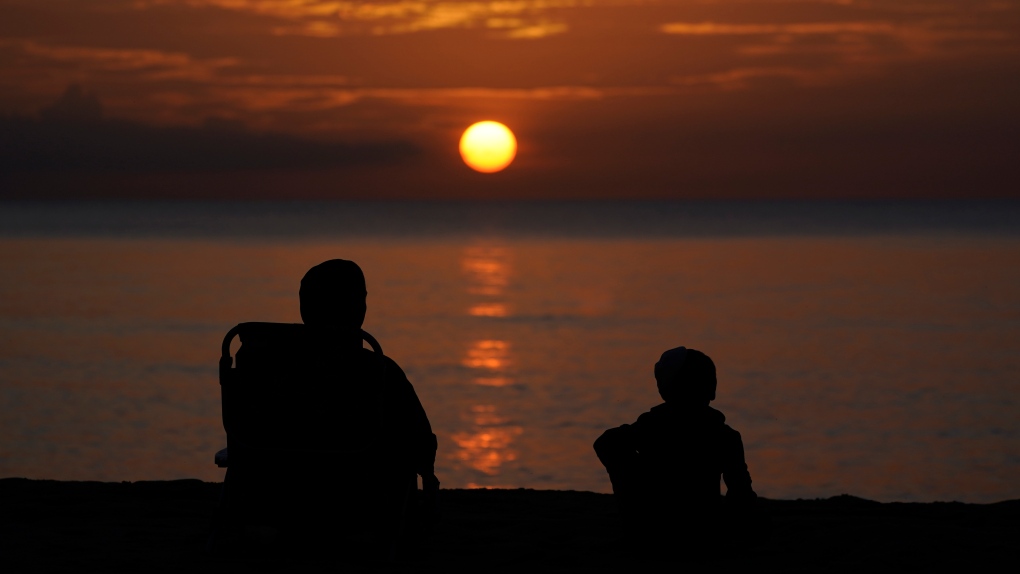
Quebec nurse had to clean up after husband's death in Montreal hospital
On a night she should have been mourning, a nurse from Quebec's Laurentians region says she was forced to clean up her husband after he died at a hospital in Montreal.
A new study suggests the risk of miscarriage may increase in the summer, which researchers say could indicate a link between extreme heat and pregnancy loss.
The study out of Boston University School of Public Health, published in the journal Epidemiology, looked at the seasonal differences in pregnancy data from more than 6,100 survey participants. They found that in North America, pregnant people have a 44 per cent higher risk of having an early miscarriage in the summer than in the winter – in particular, in the month of August in comparison to February. An early miscarriage for the purposes of this study was defined as occurring in the first eight weeks of pregnancy.
According to researchers, up to 30 per cent of pregnancies can end in spontaneous abortion, and up to half of all miscarriages are unexplained.
The risk of miscarriage at any point during the pregnancy was 31 per cent higher in August than in February.
Researchers also looked at geographical data and found that pregnant people who lived in the south or midwest United States, some of the hottest parts of the country, were more likely to experience a miscarriage in late August and early September.
“Any time you see seasonal variation in an outcome, it can give you hints about causes of that outcome,” the study’s lead author Dr. Amelia Wesselink said in a press release. “… Now we need to dig into that more to understand what kinds of exposures are more prevalent in the summer, and which of these exposures could explain the increased risk of miscarriage.”
Researchers said this study filled in gaps in past research, which tends to focus on data from pregnancy losses that occur in care at a hospital, which may exclude data from people who lost pregnancies very early on at home, or people who are not experiencing ongoing fertility issues causing miscarriage and therefore may not have sought care from a medical professional.
The study’s authors suggest that high temperatures may be a contributing factor to pregnancy loss, adding that while more research is needed to understand the possible link, health-care professionals and policymakers can begin to take action now to mitigate the effects of climbing temperatures on pregnant people.
“We know that heat is associated with higher risk of other pregnancy outcomes, such as preterm delivery, low birth weight, and stillbirth, in particular,” Wesselink said. “Medical guidance and public health messaging—including heat action plans and climate adaptation policies—need to consider the potential effects of heat on the health of pregnant people and their babies.”

On a night she should have been mourning, a nurse from Quebec's Laurentians region says she was forced to clean up her husband after he died at a hospital in Montreal.
A North Bay, Ont., lawyer who abandoned 15 clients – many of them child protection cases – has lost his licence to practise law.
Members of the Bank of Canada's governing council were split on how long the central bank should wait before it starts cutting interest rates when they met earlier this month.
Brad Marchand scored twice, including the winner in the third period, and added an assist as the Boston Bruins downed the Toronto Maple Leafs 4-2 to take a 2-1 lead in their first-round playoff series Wednesday
Cuba's foreign affairs minister has apologized to a Montreal-area family after they were sent the wrong body following the death of a loved one.
Mounties in Nanaimo, B.C., say two late-night revellers are lucky their allegedly drunken antics weren't reported to police after security cameras captured the men trying to steal a heavy sign from a downtown business.
The federal government's proposed change to capital gains taxation is expected to increase taxes on investments and mainly affect wealthy Canadians and businesses. Here's what you need to know about the move.
Canada's Deputy Prime Minister Chrystia Freeland was among the 1,700 delegates attending the two-day First Nations Major Projects Coalition (FNMPC) conference that concluded Tuesday in Toronto.
The daughter of a New Brunswick man recently exonerated from murder, is remembering her father as somebody who, despite a wrongful conviction, never became bitter or angry.

A property tax bill is perplexing a small townhouse community in Fergus, Ont.
When identical twin sisters Kim and Michelle Krezonoski were invited to compete against some of the world’s most elite female runners at last week’s Boston Marathon, they were in disbelief.
The giant stone statues guarding the Lions Gate Bridge have been dressed in custom Vancouver Canucks jerseys as the NHL playoffs get underway.
A local Oilers fan is hoping to see his team cut through the postseason, so he can cut his hair.
A family from Laval, Que. is looking for answers... and their father's body. He died on vacation in Cuba and authorities sent someone else's body back to Canada.
A former educational assistant is calling attention to the rising violence in Alberta's classrooms.
The federal government says its plan to increase taxes on capital gains is aimed at wealthy Canadians to achieve “tax fairness.”
At 6'8" and 350 pounds, there is nothing typical about UBC offensive lineman Giovanni Manu, who was born in Tonga and went to high school in Pitt Meadows.
Kevin the cat has been reunited with his family after enduring a harrowing three-day ordeal while lost at Toronto Pearson International Airport earlier this week.
 A pair of beach goers watch the sun rise over the Atlantic Ocean, Friday, June 10, 2022, in Surfside, Fla. (AP Photo/Wilfredo Lee)
A pair of beach goers watch the sun rise over the Atlantic Ocean, Friday, June 10, 2022, in Surfside, Fla. (AP Photo/Wilfredo Lee)